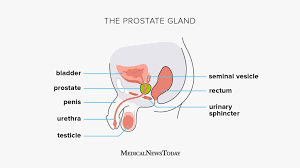Signs of prostrate problems

Prostate problems can encompass a range of conditions, with prostate cancer and benign prostatic hyperplasia (BPH) being among the most common.
It’s important to note that not all prostate problems cause noticeable symptoms, and some symptoms can overlap between different conditions.
If you experience any of the following signs or symptoms related to your prostate, it’s advisable to consult a healthcare professional for a proper evaluation and diagnosis:
Frequent Urination: Increased urgency to urinate, especially at night (nocturia), or a frequent need to urinate during the day can be indicative of prostate issues.
Difficulty Initiating Urination: Straining or difficulty starting the urine stream may be a sign of an enlarged prostate (BPH).
Weak Urine Stream: A weak or interrupted urine stream may suggest an obstruction due to an enlarged prostate.
Incomplete Emptying: Feeling like your bladder is not fully empty after urinating can be a sign of a prostate problem.
Urinary Retention: Complete inability to urinate can be a medical emergency and requires immediate attention.
Pain or Discomfort: Pain or discomfort in the lower abdomen, pelvic area, or lower back can be a sign of prostate issues. It may also radiate to the hips or thighs.
Blood in Urine or Semen: Hematuria (blood in the urine) or hematospermia (blood in semen) can be alarming and may warrant medical evaluation.
Erectile Dysfunction: Difficulty achieving or maintaining an erection can be associated with certain prostate conditions.
Decreased Force in Ejaculation: Prostate issues can sometimes lead to a reduced force of ejaculation.
Unexplained Weight Loss: Rapid, unexplained weight loss can be a sign of more advanced prostate cancer.
Bone Pain: Advanced prostate cancer can spread to the bones and cause bone pain, especially in the hips, spine, or ribs.
Urinary Tract Infections: Frequent urinary tract infections may be a sign of an underlying prostate problem, as incomplete emptying of the bladder can lead to infections.
It’s essential to remember that these symptoms can also be related to other medical conditions, and not all prostate problems are cancerous.
Early detection and proper medical evaluation are crucial for determining the underlying cause and initiating appropriate treatment if necessary. If you or someone you know is experiencing any of these symptoms, it is advisable to consult a healthcare provider for a thorough assessment and diagnosis.